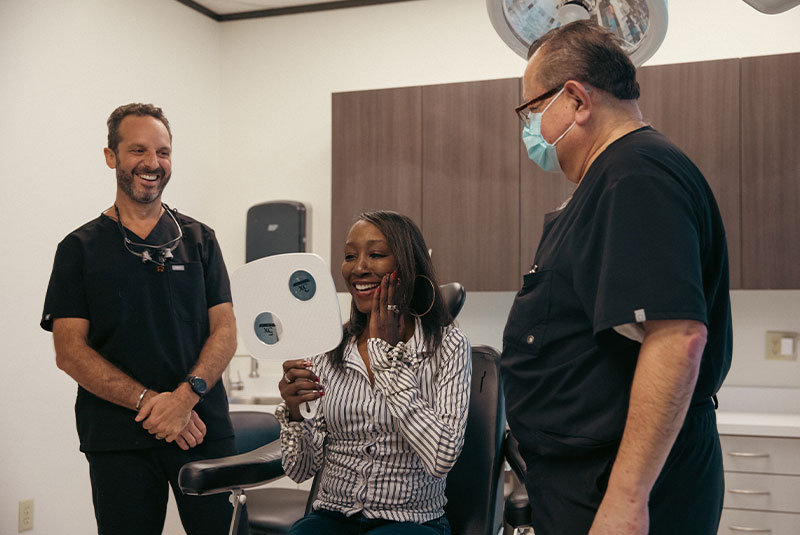ALL-ON-X DENTAL IMPLANTS - HOUSTON, TX
What to Know Before Getting Dental Implants
Dental implants are one of the most trusted solutions for replacing missing teeth. They look, feel, and function just like natural teeth, restoring your confidence and bite. Unlike dentures, implants are anchored directly into the jawbone, helping to prevent bone loss and preserve your facial structure. At Dr. Friedberg & Associates, we use advanced imaging, modern materials, and expert surgical planning to create personalized implant solutions. Whether you’ve lost one tooth or several, we can design a treatment plan that fits your needs. Plus, with IV sedation available, you can stay comfortable and relaxed throughout the process. If you're still researching your options, we recommend reviewing this external guide from the American Academy of Implant Dentistry to better understand the benefits of implants. Then, explore the FAQ below for honest answers to the most common questions we hear from patients.
Request your consultation today.
Our team of dental experts is always happy to help!
Dental Implants
Start With the Right Information
Many patients ask: How does it work? What’s recovery like? What if something goes wrong? This page answers those questions clearly. If you’re just starting your research, we also recommend the American Academy of Periodontology’s dental implant guide for trusted, science-based information.

Frequently Asked Questions (FAQ)
Common Questions About Dental Implants:
Dental implants are titanium posts that serve as artificial tooth roots. They’re surgically placed into your jawbone to support replacement teeth such as crowns, bridges, or dentures. Because they fuse naturally with bone, they offer unmatched stability and long-term oral health benefits.
Unlike traditional dentures, dental implants prevent bone loss and maintain your facial structure. As a result, they look and function like real teeth — and can last for decades when properly cared for.
Dental implants are the gold standard for tooth replacement. They restore chewing function, enhance speech clarity, and improve overall confidence. Additionally, implants don't rely on neighboring teeth for support, making them a healthier alternative to bridges.
At Dr. Friedberg & Associates, we use 3D imaging and guided implant placement for optimal accuracy. Whether you need a single implant or a full-arch restoration like All-on-X, we tailor each treatment to your specific needs.
Dental implants succeed more than 95% of the time, making them one of the most trusted solutions in modern dentistry. This success is backed by decades of innovation in surgical techniques and treatment planning. When combined with consistent dental visits and proper at-home care, implants can last many years—often a lifetime.
Dental implants succeed over 95% of the time, making them one of the most dependable solutions in modern dentistry. This impressive rate is backed by decades of clinical research, enhanced surgical techniques, and personalized treatment plans. With consistent dental visits and strong home care habits, implants can last many years—often even a lifetime.
Learn more about dental implants
See long-term success data on the National Institutes of Health site.
Who is a candidate for dental implants?
Most healthy adults with one or more missing teeth make great candidates for dental implants. Even if you’ve experienced bone loss or need an extraction, you may still qualify. Treatments such as bone grafting can prepare your jaw for implants.
Your dentist will assess your oral health, bone density, and medical history to determine if implants are the right solution for you. In many cases, even patients with complex dental needs can benefit from this long-term option.
Read more about dental implant services at Dr. Friedberg & Associates
Learn more about implant eligibility from the American Academy of Implant Dentistry
The cost of dental implants varies based on several factors—such as how many teeth need replacing, how long they’ve been missing, the type of material used, and if you’ll need additional procedures like bone grafting. At Dr. Friedberg & Associates, we’ll provide a customized treatment plan with clear pricing. Financing options and insurance assistance are also available to keep your care affordable.
Learn about our payment and financing options
Recovery is typically smooth. Most patients experience mild soreness or swelling for a few days. Over-the-counter pain relief usually helps, and you can return to light activity within 1–2 days. It typically takes a few months for the implant to fully fuse with your jawbone, ensuring long-term support.
View our guide to post-surgical healing tips
Learn about recovery at Mayo Clinic
The full process varies. Some patients finish in a few months, while others—especially those needing bone grafts or extra procedures—may need up to a year. Once your plan is in place, we can often place the implant shortly after. Osseointegration (bone fusion) takes about three to six months. During this time, you may wear a temporary restoration until your final crown, bridge, or denture is ready.
